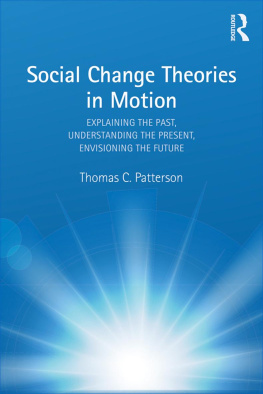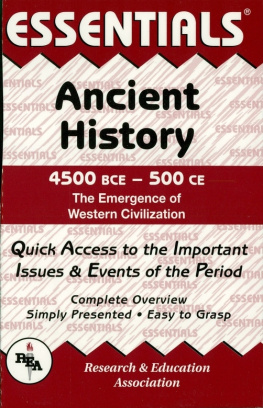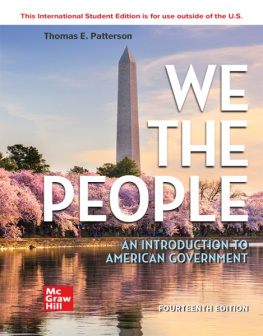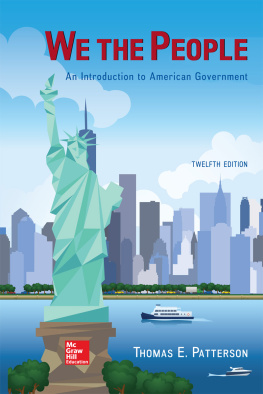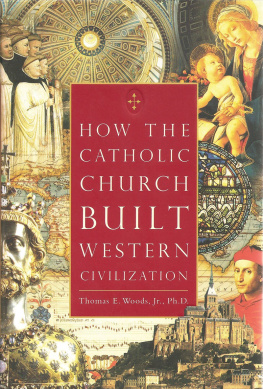Copyright 1997 by Thomas C. Patterson
All rights reserved
Library of Congress Cataloging-in-Publication Data
95-3435
CIP
Patterson, Thomas Carl.
Inventing western civilization / Thomas C. Patterson.
p. cm.(Cornerstone books)
Includes bibliographical references and index.
ISBN 978-0-85345-961-3
1. Civilization, Western.
I. Title.
II. Series: Cornerstone books (New York, N.Y.)
CB245.P339 1995 909.09821dc20
Monthly Review Press
146 West 29th Street, Suite 6W
New York, NY 10001
www.monthlyreview.org
1
INVENTING CIVILIZATION
The word civilization evokes powerful images and understandings. We in the United States have been taught, from elementary school onward, that a few ancient peopleslike the Egyptians or Greekswere civilized and that civilization achieved its highest level of development here and in other Western countries. Civilization, we are told, is beneficial, desirableand definitely preferable to being uncivilized. The idea of civilization thus always implicitly involves a comparison: the existence of civilized people implies that there are uncivilized folk who are inferior because they are not civilized. Uncivilized peoples, for their part, have either been told that they can never become civilized or that they should become civilized as soon as possible; many of those who have tried or been forced to do sosuch as the inhabitants of Bikini Atoll who were displaced from their homes so the United States could explode atom bombs in their lagoon after World War IIhave suffered greatly as a result of the advance of civilization.
Civilization is an idea that we learned in school. Further, it is an elitist idea, one that is defined by creating hierarchiesof societies, of classes, of cultures, or of races. For the elites that coined the idea, civilizations are always class-stratified, state-based societies, and civilized peoples always belong to the those classes whose privileged existences are guaranteed by the institutions and practices of the state. Uncivilized peoples, in this view, do not belong to those classes, or else they live on the margins of civilization, where the ability of the state to control their lives is weak or episodic.
The word civilization is probably used more frequently in the media today than at any time since the years immediately following World War II. Media experts simultaneously extol the virtues of civilization and warn us of threats to its existence. They remind us again and again that it is good to be civilized. After all, civilization is marked by technological progress, greater productivity, and higher standards of living. Moreover, civilized people are polished and refined, wealthier and happier than their predecessors. But, the media experts warn, crime, violence, declining test scores in public schools, and the disintegration of Values either threaten civilization, or else they are already signs of its decline.
For Newt Gingrich, the current speaker of the House of Representatives, the latter are evidence of a monumental crisis in American civilization. In fact, civilization is one of Gingrichs favorite topics. He uses the word in almost every speech or pronouncement. He does not mean civilization in any vague sense; he does not even mean Western civilization. He means American civilization. The United States is a civilization whose founding principlespersonal strength, free enterprise, a spirit of invention and discovery, and the uniqueness of the American experiencehave set it on a different trajectory from that of, for instance, Europe.
Gingrich believes that the crisis in American civilization is in part the result of the failure of the institutions and programs that underpinned the Great Society programs of the mid-1960s. As he puts it, these ruined the poor and created a culture of poverty and a culture
Newt Gingrich gives his views on welfare reform to a single mother in Powder Springs, Georgia, 1995. [Bill Clark/Impact Visulais]
Gingrich also believes that American civilization is threatened by the cultural diversity found in the United States in the late twentieth century. He believes that this diversity was in part as a result of massive in-migration since the 1960s, as well as the civil rights movement, which demanded equal treatment and rights, and affirmative action programs, which provided a few economic opportunities to women and minorities. Gingrich believes that the state must control this diversity in order to preserve what is quintessentially American:
For America to survive as a civilization, English has to be our common language. If we allow the multicultural model of a multilingual America to become dominant, this society will disintegrate.
For Gingrich and those who think as he does, the Spanish-speaking enclaves in metropolitan Miami and Los Angeles, French-speaking neighborhoods in small New England towns like Waterville, Maine, or Haitian Creole-speaking neighborhoods in Brooklyn, all threaten American civilization by their very existence.
Let us stop for a moment to consider precisely what Gingrich means when he uses the word civilization. For one thing, in a civilized society, the state should enact legislation to achieve certain goals. One goal should be to ensure technological progress at a steadily accelerating pace, since the key to the future of American civilization is the development of a high-tech information economy. Thus, the government, in its role as consumer of high-tech goods, should stimulate technological innovation, which will then trickle down to broader markets.
The advanced, high-tech civilization that Gingrich envisages is also a society rooted in inequalities of various kinds. For instance, he wants the state to pass laws that redistribute income upward. And since civilization involves culture and values, the state should also pass laws that promote certain kinds of values and behavior. For example, it should require that only English be spoken in public places. Practices that aid women or members of minority groups should either be placed under the control of men, restricted, or criminalized. Civilized people, according to Gingrich, are those who cultivate the beliefs, values, and goals that encourage refined behavior. Those who will not or cannot subscribe to such standards are by definition the barbarians, or the underclasses, whose existence is a threat to civilization.
Gingrichs fears are echoed by Roger Kimballs commentary a few years ago on the dangers of multiculturalisma perspective which recognizes that different communities have different cultural practices and values. Kimball wrote:




